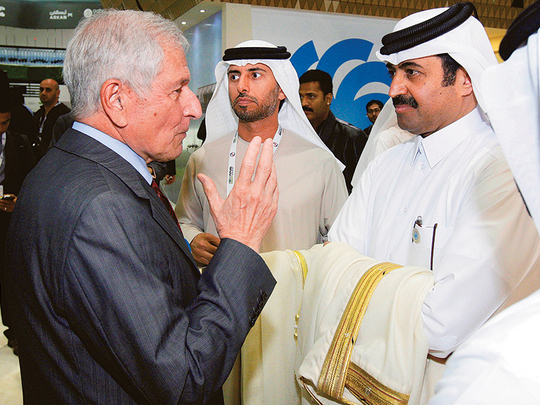
Abu Dhabi: “Renewable energy is no longer a ‘future energy’ but ‘today’s energy’,” a senior official said, adding that the eight edition of the World Future Energy Summit (WFES) left this message to the world.
The summit as part of the weeklong Abu Dhabi Sustainability Week ended on Thursday, attracting more than 30,000 people from across the globe.
When the WFES was launched in 2008, renewable energy was a “future energy” but a paradigm shift occurred in the past seven years thanks to the drastic fall in its costs, said Dr Fred Moavenzadeh, President of Masdar Institute of Science and Technology in Abu Dhabi.
Dubai’s announcement at the summit on Wednesday to triple the targeted share of renewables in its energy mix to 15 per cent by 2030 proved this paradigm shift, he told Gulf News in an interview on the sidelines of the summit on Thursday.
“It is a bold decision [Dubai’s move] that tells the world it is possible [adopting renewable energy].”
The falling costs of solar, wind and geothermal energy sources has made this possible, he said referring to the latest developments in the sector.
The levelised cost of electricity of utility-scale solar PV (photovoltaic) halved between 2010 and 2014, according to an International Renewable Energy Agency (Irena) report published last week. Onshore wind, already deployed in more than 100 countries, is now one of the most competitive renewable energy sources available. The best onshore wind projects around the world are delivering electricity for $0.05/kWh (Dh0.18/kWh) without financial support. Mature technologies such as biomass, hydropower and geothermal have been competitive for some time, the Irena report said.
Positive development
Dr Fred said this positive trend emerged in a comparatively short span of time and more such positive developments in near future will further boost renewable energy.
Both Abu Dhabi and Dubai have now committed to increase the share of renewables to seven per cent in their energy mix and this will inspire the rest of the world, Dr Moavenzadeh said.
He compared the UAE’s initiatives in renewable energy to the former US President Kennedy’s decision to send a man to the Moon. “That decision changed the US as a whole [thanks to change in science and technology sector]. The UAE’s decision to adopt renewable energy has made such a change,” Dr Moavenzadeh said.
He said the participation of people in the summit has increased. The scope of the summit was also extended with the introduction of International Water Summit and Ecowaste, the waste management summit. “I find an overall improvement in people’s awareness on sustainability,” Dr Moavenzadeh said.













